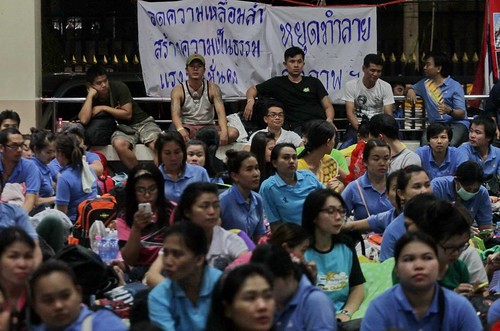The ambiguity and legal loopholes of the Public Assembly Act make it difficult for the labour movement to hold assemblies. Labour unionists are calling for the authorities to come up with a clear framework of practical law enforcement.
On Friday, 25 March 2016, the Confederation of Industrial Labour of Thailand, in coordination with IndustriALL Global Union, held a seminar on the 2014 Public Assembly Act and its impact on the exercise of labour rights under the 1975 Labour Relations Act. The panellists comprised labour activists, legal officers and government officials.
Chalee Loysong, the Vice President of the Thai Labour Solidarity Committee (TLSC), said that the 2014 Public Assembly Act has weakened the bargaining power of the union movement by making it difficult to host a rally which is a key mechanism of unions.
The 1975 Labour Relations Act gives workers the right to hold a rally when they have a labour dispute with their employers. The act also allows rallies at the Ministry of Labour if the workers want the Ministry to act as mediator to settle a dispute. And Article 3(5) of the Public Assembly Act clearly states that assemblies which are protected by other laws are exempted from the Act.
However, since 13 August 2014 when the Public Assembly Act came into force, the authorities and employers usually use the Act to prevent labour union rallies. It is because the Act has a very big legal loophole on the definition of “assembly”, said Chalee.
Chalee gave the example of the rally of Sanko Gosei workers at the Ministry of Labour on 6 January 2016. The Ministry told the protesters to disperse, arguing that the rally violated the Public Assembly Act. The incident led to the brief detention of the union leaders.
Paitoon Bangluang, President of the Eastern Union Group, said that authorities do not cooperate to facilitate rallies under this Act. He shared an experience when his union hosted a rally against their employer. “We strictly followed the law. We informed the police that we wanted to host a rally. However, on the day of the rally, other authorities such as the Provincial Governor and Deputy Governor came to the rally site and told us to disperse,” said Paitoon.
Wisut Rueangrit, Vice President of the Federation of Thailand Automobile Workers, said that public assemblies are a feature of the labour movement. For instance, normally during a labour dispute, a union has to inform the results of negotiations to all workers every day and this process requires a large public space.
“We would like to know whether we have to ask for permission to have this kind of assembly or not. We once asked police officers. Some said we have to, some said we don’t, some avoided answering and did not cooperate,” said Wisut.
Pornnarai Thuiyakai, a lawyer from the TLSC, pointed to the regulation that prohibits the carrying of knives and weapons in an assembly.
“How about a cooking knife? Because generally people have to cook during a long rally and knives are necessary for cooking,” said Pornnarai
Another problem is that the Act does not give a clear definition of the organizer of an assembly.
“What if there was a post on a social network saying that a labour union will submit a petition to the Ministry of Labour tomorrow and then people share that post nationwide and it eventually becomes a big rally. Will the people who share that post be considered as organizers of the rally, as they also helped organize the protest?” Pornnarai asked.
Pornnarai suggested that the Ministry of Labour should issue regulations informing workers of what they can and cannot do under the Act. Otherwise, the Act will take away the rights of workers to fight for their standard of living.
The rally of Sanko Gosei workers at the Ministry of Labour on 6 January 2016

